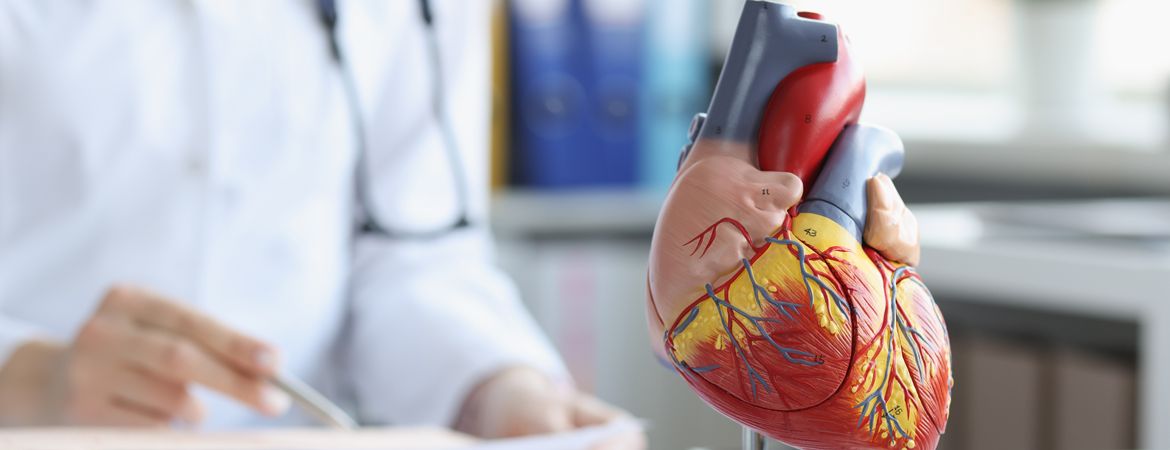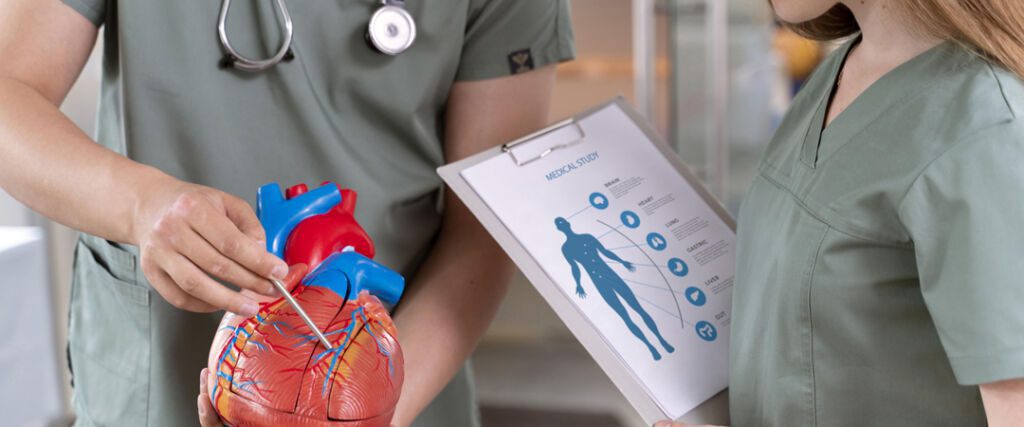
In Tunisia, almost 30% of deaths each year are due to cardiovascular disease. Among the many causes, smoking is the main factor. To find out more about these diseases and the role of the cardiologist, we invite you to read on.
THE FIELD OF INTERVENTION
Cardiology is the branch of medicine that studies, diagnoses, treats and prevents diseases of the heart and blood vessels. It includes several sub-specialties: rhythmology, phlebology, angiology and paediatric cardiology.
Rhythmology deals with heart rhythm and conduction disorders. Phlebology deals with venous pathologies. Angiology studies diseases of the blood vessels.
Cardiology also includes coronary angiography and electrophysiology. The former visualises the coronary arteries, while the latter treats heart rhythm disorders.
You should also be familiar with interventional cardiology. Interventional cardiology includes all therapeutic and exploratory cardiological procedures performed by endovascular means. In other words, it is the use of invasive procedures to diagnose and treat cardiovascular disease.

WHEN SHOULD I SEE A CARDIOLOGIST?
In general, your GP will refer you to a cardiologist for a consultation. However, in an emergency you can go directly to a cardiologist. For example, if you are diagnosed with cardiovascular disease, you should see a cardiologist immediately. This could be heart failure, coronary insufficiency, pericarditis, endocarditis or other conditions.
You may also want to see a cardiologist after a specific heart problem, such as a heart attack.
Other symptoms may also prompt you to see a cardiologist. You should go immediately if you have:
- Chest pain;
- Any kind of discomfort in the middle of your chest;
- Pain or discomfort in your arms, elbows, jaw, left shoulder or back;
- Shortness of breath;
- Difficulty breathing;
- feeling dizzy;
- light-headedness;
- cold sweats
- confusion
- nausea;
- numbness in the face, arms or legs, especially on one side of the body;
- Difficulty speaking or understanding speech;
- Trouble seeing in one or both eyes;
- Difficulty walking;
- Loss of balance or coordination;
- severe headache with no known cause
- loss of consciousness
- stomach cramps;
- Swollen joints, and many others.
On the other hand, you should also consult a cardiologist to prevent cardiovascular disease, especially if you’re at risk. The risk factors for these diseases are age (women over 60 and men over 50), diabetes, smoking, a sedentary lifestyle and obesity. People with a family history of heart problems or stroke and those with high blood pressure are also more likely to develop these conditions.
Once you’ve been seen by a cardiologist, he or she will examine you. He or she will ask you questions about your family history, medical history and lifestyle. After the interview, the specialist will carry out a clinical examination. This includes listening to your lungs and heart, taking your blood pressure and pulse, palpating your blood vessels and looking for signs of heart failure.
He or she may also carry out an electrocardiogram, chest x-ray, MRI or other complementary tests to detect any abnormalities. In some cases, you may also be asked to undergo a stress test.
Once all these tests have been carried out, the doctor will be able to suggest the most appropriate treatment.

WHAT CONDITIONS DOES A CARDIOLOGIST TREAT?
Here are some of the conditions that a cardiologist will treat:
CORONARY HEART DISEASE
A cardiologist can treat coronary artery disease. These are conditions that affect the blood vessels, such as coronary artery disease. Coronary artery disease is caused by a build-up of plaque in the artery walls. This causes the coronary arteries to narrow, blocking the flow of blood to certain parts of the heart.
As a result, the heart has difficulty pumping blood out of the body. The symptoms of coronary artery disease can take years to appear. As the disease progresses, it manifests itself as a heart attack.
You may experience chest pain, palpitations, nausea, tiredness, difficulty breathing, and loss of consciousness…
HEART ATTACKS AND STROKES
When we talk about cardiovascular disease, we think of heart attacks and strokes. These are emergencies or acute events caused by a blockage in an artery that prevents blood from reaching the brain or heart. They can also be caused by bleeding from a cerebral blood vessel or the presence of blood clots.
Risk factors such as smoking, poor diet, obesity, sedentary lifestyle, high blood pressure, diabetes and hyperlipidaemia also contribute to these conditions.
Treatment starts with the cardiologist identifying the cause and location of the heart attack. He or she will then use methods to restore blood flow to the blocked coronary artery. Surgery may often be needed. In some cases, medication may also be needed to prevent complications.
HIGH BLOOD PRESSURE
According to the WHO, hypertension is a cardiovascular disease that kills nearly 9 million people every year. It is characterised by high blood pressure. It needs to be treated early to avoid complications. It can even cause strokes in older people.
By consulting a cardiologist, the patient will receive the appropriate treatment. The specialist or general practitioner may prescribe antihypertensive medication. He or she will also advise on lifestyle changes: diet, exercise, stopping smoking and alcohol consumption.

